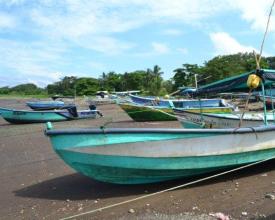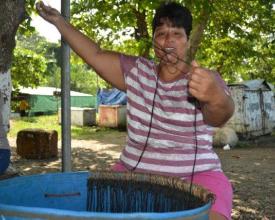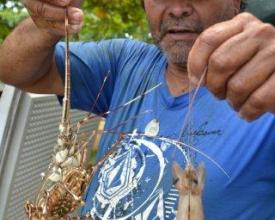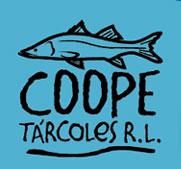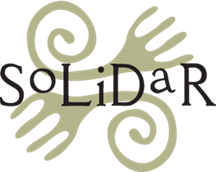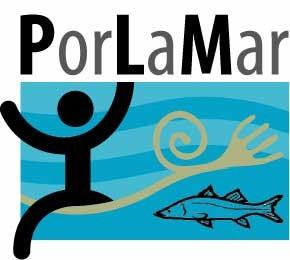Communities leading sustainable Fisheries Management
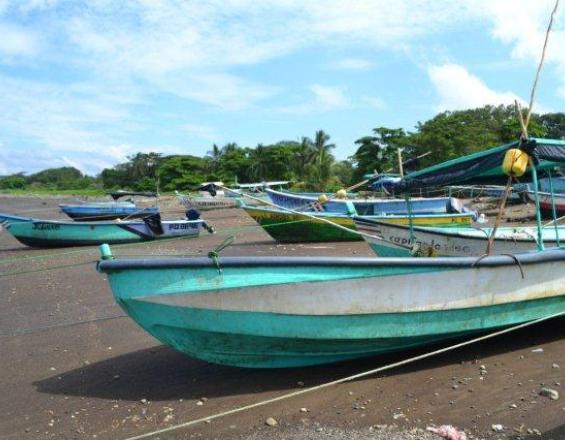
Costa Rica’s coastal population is culturally and economically closely tied to the seashore and strongly dependent on artisanal fisheries. However, blocked access to marine resources, degraded and polluted habitats and declining fish stocks threaten livelihoods and increase local poverty. The artisanal fishermen’s cooperative CoopeTárcoles R.L, encouraged the community to use local marine resources sustainably, thus guaranteeing their economic future and cultural way of life. They led a dialogue with the semi-industrial fleet to reach agreements on the use of the marine territory. They have promoted a collaborative governance model for the management of the country´s marine territory where fishers and government work together towards responsible fishing and improvement of the quality of life of the communities.
Context
Challenges addressed
Restricted access to marine resources, declining fish stocks and increasing poverty. Rural communities in Costa Rica such as Tárcoles are strongly dependent on artisanal fisheries for their livelihood. Rapidly growing real estate development and even some marine conservation initiatives that do not include a human rights based approach, limit the access to coastal and marine resources. Local fishermen witness declining fish stocks due to pollution, illegal fishing and overfishing. Degraded habitats reduce important food and revenue sources, thus increasing local poverty.
Location
Process
Summary of the process
The establishment of the marine managed area (MMA) and its legal recognition by the government and all actors involed are crucial first steps in the process. Participatory Governance ensures that all stakeholders are involved in setting the rules and also enforcing them. This also builds trust and improves long-term relations between different actors. The Fishery database enables data driven management actions and ensures that fishermen are an integrative part of the process. The adoption of responsible fishing practices leads to a more sustainable exploitation of marine resources and helps population recovery of overfished stocks. Ecotourism provides and alternative income to fishermen, and can alleviate fishing pressure in the MMA, although it is crucial to have rules in place to make sure that tourism activities remain sustainable, both for the local communities and their livelihoods, and for the marine ecosystem.
Building Blocks
Community-managed Marine Area
The policy that regulates the recognition of a Marine Responsible Fishing Areas (MRFA) is under the control of INCOPESCA, the National Fishing and Aquaculture Institute. In 2009, CoopeTárcoles R.L requested the Costa Rican government to recognize a MRFA in their fishing territory, which was approved in 2011.
The recognition of this area and fishers rights helps to conserve both the marine biodiversity and the cultural identity of the local community.
Enabling factors
• A tradition of environmental awareness of the locals • Fishermen recognize the need to conserve natural heritage. • Policy incidence and dialogue and negotiation between fleets. Collective action and organization.
Lesson learned
1.- Dialogue and agreements for responsible fishing and sustainable use are much more productive and efficient in the long term than excluding fleets.
2.- Organization and collective action is crucial for the sustainable use of resources.
3.- Traditional knowledge is crucial for the management of small scale fisheries.
Negotiation and Legal Recognition
A participative process with artisanal fishers of Coope Tárcoles R.L., government authorities represented by INCOPESCA and CoopeSoliDar R.L. as a facilitator of the process, was initiated for the development of the MRFA fishing management plan.
Artisanal fishers and semi-industrial trawlers was agreed that semi-industrial trawlers would stay for 3 miles from the coast. During 2009 semi-industrial trawlers made the proposal to move out from water areas with a depth of 15 meters or less but requested that artisanal shrimp fishers had also to respect this no fishing zone so that the white shrimp population could recuperate faster.
There was also an agreement for a one-year ban on shrimp captures by artisanal and commercial fleets, which was transformed in year 2012 by the INCOPESCA Board of Directors into a national decree (AJDIP-193) as stipulated by the MRFA decree.
After the ban, Coope Tárcoles R.L. requested permits for shrimp fishing. This request was backed up by the INCOPESCA research department and approved and the shrimp semi-industrial trawlers were requested to permanently stay out of the agreed 15 meter zone. Later, shrimp trawlers agreed to move out of the area 5 nautical miles from the coast to support sustainable shrimp populations.
Enabling factors
• Cooperation with and assistance by Coope Solidar
Government and shrimp fishing industry willing to dialogue
Lesson learned
Prior informed consent is important
Capacity strengthening and respect of local views and cultural identity is crucial
Long-term relationship
Trust and understanding. between actors
Participatory Local Governance
MRFA are defined as “areas where fishing activities are regulated to secure the sustainable use of resources in the long term and where the conservation, use and management action of INCOPESCA can count with the support of coastal communities and other institutions”. (Executive Decree No. 35502 of October 1st 2009).
This new legislation recognized the fishers effort for a collaborative governance model for the management of the marine territory.
The local community developed a Fisheries Management Plan based on their traditional knowledge. A commission, composed of members of the fishing cooperative and governmental authorities, is responsible for the further management of the area.
Enabling factors
• A given tradition of environmental awareness with the locals
• Need to conserve natural heritage recognized.
• Respect for and inclusion of local and traditional knowledge for management.
Lesson learned
Recognition of traditional knowledge is crucial for the management and conservation of a marine territory.
Fishers can do research as a process of learning new things.
It is better to do things than to say them with no practical implementation
Collaborative governance models recognition (as the Marine Responsible Fishing Areas) are crucial for the future conservation of the sea. Recognizing this other models of governance by the governments is a crucial issue for the future of marine conservation.
Identity, Participation and capacity strengthening of small scale fishers towards responsible fishing and a human rights approach to marine conservation is very important for conservation.
Fishery Database
Each fisher records their daily fish catches, methods and site locations and feeds the information into a database. This information aids in monitoring the abundance and diversity of key species and serves as an important management tool. Data are analyzed by technicians/scientists, and the results are discussed with fishermen
Enabling factors
Long term view of the process.
Data are gathered by fisher’s organization and are maintained as a collective asset.
Research questions adressed with the data base respond to the needs of fishers.
Lesson learned
Information is power.
Participatory Information gathering is important for practical and immediate management of the fishery
Trustful relationship between technicians from institutions and fishers.
Basic knowledge/ training is important.
Responsible Fishing Code of Conduct
The fishers adopt voluntary standards for responsible fishing based on FAO recommendations. The Local Code of Conduct for Responsible Fisheries helps to ensure the conservation and sustainable use of coastal and marine resources and was applied once the Marine Responsible fishing area was recognized.
Enabling factors
• A given tradition of environmental awareness with the locals
• Need to conserve natural heritage recognized.
• Collaborative governance model in place and participatory management plan developed.
Lesson learned
Voluntary actions can be very effective if agreed and understood by all.
The ecosystem approach to fisheries works.
Resources
Sustainable Ecotourism
Cultural tourism provides an additional source of income for the local community. Guided tours promote community traditions, art of fishing and wealth of natural resources. However, if not well controlled and based upon with strong values and rules, recreational fishing can be unsustainable and a source of local conflict.
The Consorcio Por la Mar R.L developed guided visits to learn about the culture of being a small scale fisher in Costa Rica.
Enabling factors
Cultural identity
Natural resource base recuperation
Traditional knowledge
Lesson learned
Recreational fishing can be a new threat for the sustainable management of the marine area if it is not well controlled.
Cultural identity and traditional knowledge are very important for sustainable livelihoods
Norms and regulations need to be established before new activities start to function.
Recognition of women work in fisheries is important and very important for this process.
No training investment is really needed since fishers know by heart exactly what small scale fisheries is all about.
Impacts
• Recognition of Marine Area for Responsible Fishing • Local Responsible Fishing Code and participatory mapping and governance model that considers scientific and traditional knowledge • Fishermen from Tárcoles and neighboring communities actively participate in the zoning process. • Environmental management plan for better fish processing practices and clean local beach shores • Database developed to monitor all exploited species in the Tárcoles area• Institutionalized sustainable fishing protects economic future of the community • Cooperative benefits workers in related occupations - often women and youth • Collective action provides an equitable and just distribution of benefits. • Development of a local enterprise that promotes guided visits to learn about local fishing practices • Expanding ecotourism provides alternative income sources. • Proposal for the recognition of a community governance model to ensure the collaborative management of MPAs by communities and government. • Establishment of a community-based Marine Area of Responsible Artisanal Fishing of Tárcoles (MARAFT) • Uniting artisanal fishers for political purposes through visits to the localities in Tárcoles. • Tárcoles has been a flagship project in the creation of a National Network of Marine Responsible Fishing Areas.
Beneficiaries
local communities, artisanal fisherfolk, semi-industrial fishery and tourism
